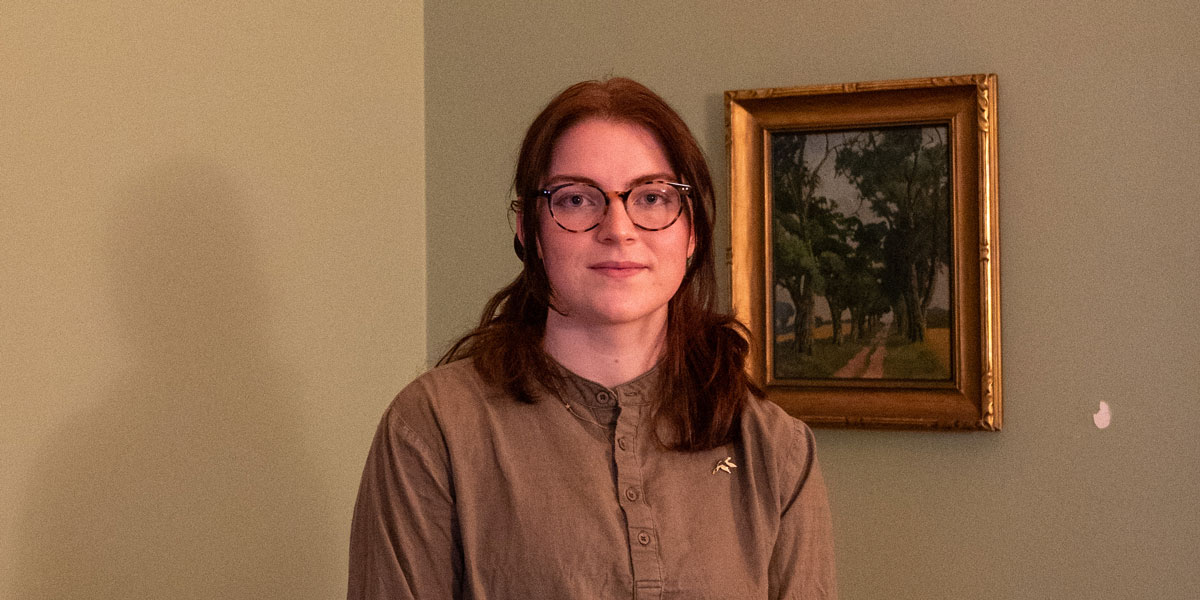Undergrad Research Explores Supports for Non-Binary High Schoolers

Undergraduate fellow Seavey van Walsum found a home for their research through the Northrop Frye Centre. (Photo by Minh Truong)
By Sally Szuster
When Seavey van Walsum (they/ them) was coming out as non-binary during their high school years in a rural town in Maine, the support that they received from teachers, the school principal and other students made all the difference. “I didn’t know what supports there were for me, and if there was a right way or a wrong way of coming out,” says Van Walsum. “When the dean of my high school called me into the office to ask me what I needed and what the school could do better to support me, it made me feel better.”
Today, as a fourth-year Vic student majoring in literature and critical theory, Van Walsum is immersed in researching how teachers in the Toronto District School Board are using tools and resources to support students who identify as non-binary. “Kids are identifying as gender fluid at a younger age now, and they understand more than adults sometimes give them credit for. It’s important to understand what influences how teachers support their students and interpret school policy. They may feel hesitant about offering certain kinds of support because of political stressors,” says Van Walsum. “The emotions educators have may impact their decision-making, and if we have a better understanding of educators’ subjective responses—as well as what they attribute it to—we can see how established processes, policies and resources operate in Toronto.”
Thanks to the Northrop Frye Centre at Victoria University, Van Walsum has found a home for their research. As an undergraduate fellow, they have access to postgraduate fellows and professors who provide mentorship. “The opportunity to work in labs with postgraduate students was incredibly inspiring to me. The Northrop Frye Centre also gives me a beautiful study space to work on my research,” explains Van Walsum.
Within higher education, research is more often seen as a graduate, PhD or master’s endeavour; however, Victoria College has prioritized undergraduate research, recognizing that students working on their bachelor’s degrees should also be builders of knowledge. The College has a full-time undergraduate research coordinator who helps students to connect their passions with research opportunities. Every year, Research Day gives undergraduate students the opportunity to publicly showcase their work.
As undergraduate fellows, five students call the Northrop Frye Centre their research home at Vic U, thanks to philanthropic support from both Vic U and Vic alumni who provide the funds for the scholarship each student receives.
"It’s really given me the opportunity to cultivate my academic focus,” says Van Walsum, who will be pursuing a psychology degree next year. “I’ve been so supported! In particular, Professor Robert Davidson has offered not only his moral support, but has also pushed me to focus on areas that I hadn’t previously considered,” says Van Walsum, whose research is also supervised by Professor Julia Forgie from the Education & Society program, and Professor Julie Moreau from the Department of Political Science.
“The students at the Northrop Frye Centre inspire me every day. Research takes courage because you’re often asking tough questions, and it’s rarely a straightforward path to find answers. That’s why we are so committed to nurturing a convivial research community to support and learn from one another,” says Professor Robert Davidson, director of the centre. “Open and diverse academic dialogue gives students the opportunity to come together for meaningful conversations and to broaden their way of thinking.”
Gifts directed toward the Northrop Frye Centre help to expand the centre’s community of undergraduate fellows, who engage in these wonderful creative research opportunities and develop the skills they need to shape our rapidly changing world. If you would like to make a donation to the Northrop Frye Centre, please visit uoft.me/givetovic and enter “NFC” under the section "Other please specify.”
